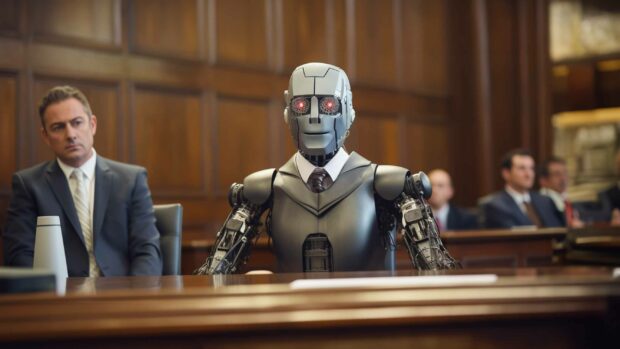The boring and confusing legalese in most contracts is still being written by lawyers and not ChatGPT, at least for now. According to a new survey from Litify, 62% of lawyers are NOT using artificial intelligence (AI). This makes the legal profession one of the slowest industries to adopt artificial intelligence tools.
Here’s why most lawyers hate the idea of “AI lawyers”, but how some pioneers in the legal industry are starting to experiment with AI tools like Google Bard and ChatGPT.
Will Lawyers Be Replaced By AI Lawyers? Not If Lawyers Can Help It!

Even though AI has the potential to automate a lot of the tedious and repetitive legal tasks, most lawyers aren’t interested in using AI tools.
So, why are lawyers so resistant to AI? There are a few plenty of reasons.
- Security And Privacy Concerns: Lawyers work with a lot of sensitive information. As a result, many of them aren’t ready to trust a new untested technology with their client’s secrets. They aren’t alone. Companies like Apple have also famously banned ChatGPT.
- Lack Of Training: Lack of knowledge on how legal staff can use AI properly was also a major concern. There’s lots of information online on how AI can be used for marketing, sales, and content production, but that same information isn’t available for lawyers.
- Severe Consequences For Mistakes: Some industries like sales and customer service have been quick to adapt AI technology. But the consequences of a customer service response mistake don’t have the same consequences as a legal mistake. For example, one lawyer faced the wrath of a judge after they unknowingly used fake legal cases in court. The lawyer used ChatGPT to generate a legal document that mentioned court cases that didn’t exist.
- Lawyers Are Skeptical Of New Technology: They’ve seen a lot of fads come and go, and they’re not quick to adopt something new without a lot of proof that it will work. For example, where are the people now who promote blockchain and NFT technology for law firms?
- Job Security: According to the survey, many lawyers are worried that AI will take their jobs. They’re right to be concerned. AI is already being used to automate tasks like document review and legal research. And as AI technology continues to improve, it’s likely that even more legal-related tasks could be automated.
How Lawyers Are Using AI

Despite their concerns, there’s no need for lawyers to panic about AI lawyers. Will AI replace lawyers? Probably not. In fact, AI has the potential to make lawyers more valuable and productive than ever before. According to the Litify survey, 62% of lawyers aren’t using AI, but 38% of them are starting to experiment.
Here are some of the ways that AI is already being used in the legal industry:
- Document Review: AI can be used to quickly review large legal documents. Try giving Google Bard a URL to a legal case and then ask it to summarize. It’s amazing! This alone can save lawyers a lot of time.
- Legal Research: AI can be used to search for and analyze legal precedent. This can help lawyers to find the best arguments for their cases.
- Negotiation: AI can be used to help lawyers to negotiate more effectively. AI can analyze data and identify potential areas of compromise.
- Trial Preparation: AI can be used to help lawyers prepare for trial. AI can create trial exhibits, analyze witness testimony, and even generate opening and closing arguments.
Using AI In The Legal Industry

As AI technology continues to improve, we can expect to see even more innovative legal applications of AI in the future. AI can automate the tasks that lawyers don’t like doing and free them up to focus on more strategic work. If used properly, AI has the potential to make lawyers more efficient, effective, and valuable. So instead of fearing AI lawyers, legal professionals may want to embrace the idea. Otherwise, your competitors might figure out an AI strategy before you even sign up for an account.
I’m a dog owner that loves poetry, vampires, mountain biking, and cosplay. I’m open to ideas and still trying to figure my SFO life out one blog post at a time. LF ISO SWF GSOH SI DDF.














 Did A Bot Write That? 5 Free AI Detection Tools That Can Help Expose ChatGPT Cheating
Did A Bot Write That? 5 Free AI Detection Tools That Can Help Expose ChatGPT Cheating
Leave a Reply
You must be logged in to post a comment.